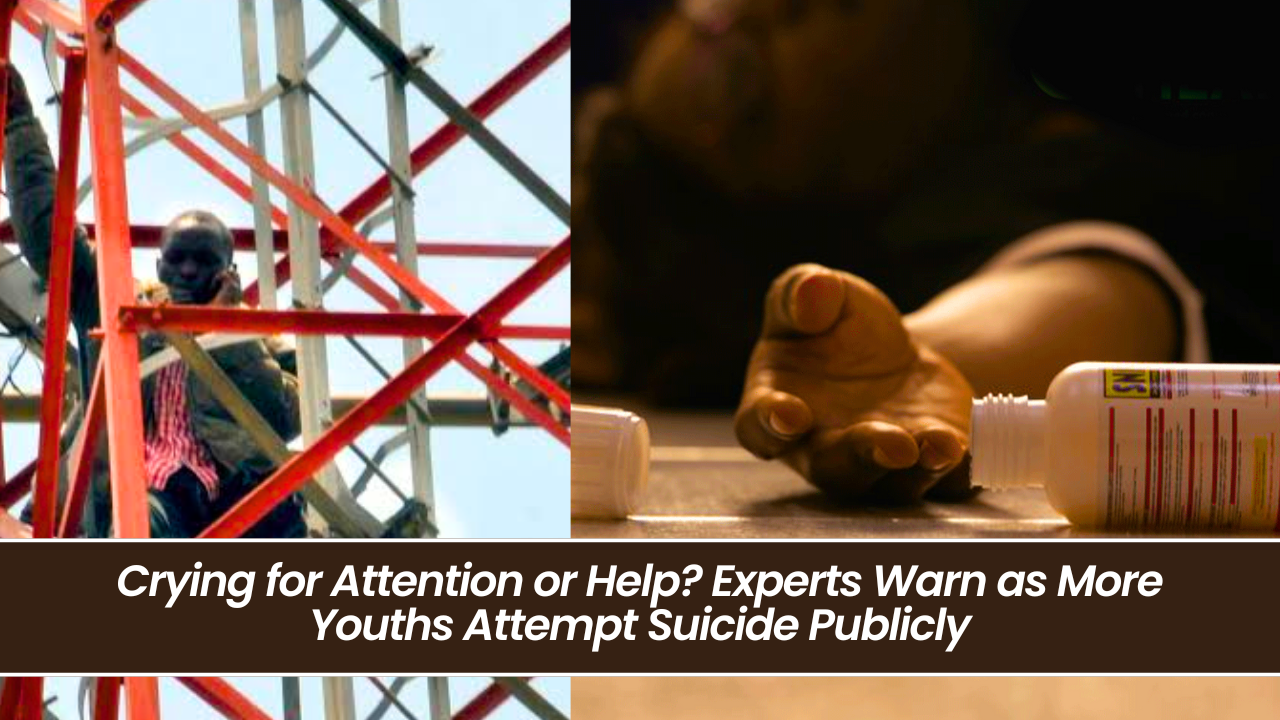YOUTH MATTERS

CRYING FOR ATTENTION OR HELP? EXPERTS WARN AS MORE YOUTHS ATTEMPT SUICIDE PUBLICLY
Despite suicide attempts being classified as a criminal offence in Nigeria, a troubling rise in such incidents—particularly among young people—is generating nationwide concern. From scaling high-rise structures to issuing public ultimatums, many young Nigerians are increasingly using life-threatening stunts as a means to express desperation or demand attention.
On Monday morning, tension gripped the Gadar Lado area along Zaria Road in Kano, when a 19-year-old identified as Ibrahim Abubakar climbed a massive billboard and threatened to end his life unless a well-known TikTok personality, Abdul BK, showed up. Abubakar, reportedly from Adamawa State, remained on the billboard for several hours, murmuring to himself as a crowd gathered below, leading to traffic congestion and panic.
According to police, the young man eventually descended safely after the social media influencer arrived at the scene.
Incidents like this are becoming increasingly frequent across the country. Earlier in June, another young man, Adamu Salisu, scaled a telecom mast in Bauchi, refusing to come down unless a prominent NNPCL official, Bala Wunti, declared interest in running for governor in 2027.
In a separate case in Abuja last year, Shaibu Yusuf from Maiduguri climbed a 120-foot broadcast mast at Aso Radio & TV, threatening to end his life unless the federal government reversed its decision on fuel subsidy removal, citing unbearable economic hardship.
These incidents have drawn widespread attention and ignited debates around mental health, youth frustration, and the pressures of socio-economic instability.
Suicide Attempts Remain a Crime Under Nigerian Law
A legal expert, Barrister Abdulrahman Yusuf, emphasized that under Nigerian law, attempting to take one's own life is a punishable offense. He cited Section 231 of the Penal Code, which prescribes a penalty of up to one year imprisonment, a fine, or both.
While noting that the law aims to deter such actions, he also advocated for increased mental health support and public education to address underlying causes.
Experts Warn Against Dangerous “Trend”
Hafsat Bahara, a university lecturer in Kano, voiced serious concern about what she described as the growing normalization of such dangerous acts among the youth.
“This behavior of climbing masts and billboards to demand attention or support is becoming disturbingly trendy,” she noted.
Bahara stressed that beyond the emotional message these individuals try to convey, their actions pose physical danger and disrupt public life.
“Climbing high structures isn’t just risky—it can be fatal. One wrong step and the person could fall to their death,” she warned. She also pointed to the Gadar Lado incident, noting how it led to hours of traffic delays and financial losses for many commuters and traders.
Calling for firmer enforcement, she suggested that authorities should charge those found to be staging such acts purely for public attention, describing them as a misuse of public resources and time.
A Cry for Help, Not Just Attention
On the other hand, health activist Zulaihat Danjuma believes these actions often reflect deeper emotional struggles and should be met with empathy rather than punishment.
“Sometimes it’s not about wanting to die—it’s about wanting to be heard,” she said.
She explained that public suicide threats may stem from accumulated emotional distress, isolation, family problems, broken relationships, or financial struggles.
“There’s a lot weighing down young people today. Many are tired—not just from economic hardship but from unresolved personal issues,” she explained.
Danjuma also highlighted the stigma surrounding mental health in Nigeria, which often leaves people feeling alone with their thoughts.
“Talking about suicide is taboo in many African homes. When someone speaks up, they’re often dismissed or told to pray harder, rather than being offered support,” she said.
She emphasized that suicidal ideation is often linked to mental health conditions like depression, PTSD, and trauma. According to her, it’s important to recognize these challenges and provide platforms for open dialogue.
“No condition is permanent. People need to be reminded of that truth—and supported through their struggles,” she said.
She called on the government to launch nationwide mental health awareness campaigns, improve access to counselling, and invest in youth empowerment programs, including job creation.
"This represents a significant development in our ongoing coverage of current events."— Editorial Board









